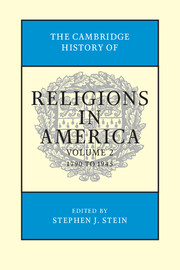Book contents
- Frontmatter
- Contents
- Contributors
- Editor's Introduction
- SECTION I RELIGION IN NORTH AMERICA
- SECTION II RELIGIONS IN THE NEW NATION, 1790–1865
- SECTION III CHANGING RELIGIOUS REALITIES
- SECTION IV RELIGIOUS RESPONSES TO MODERN LIFE AND THOUGHT
- 21 Religion and Immigration, 1865–1945
- 22 Religion and the Modern City, 1865–1945
- 23 Religious Responses to Industrialization, 1865–1945
- 24 Religious Responses to Modern Science, 1865–1945
- 25 Religious Responses to Philosophy in America, 1865–1945
- 26 Fundamentalism
- 27 Religiously Informed Social Reform and Reaction in the Era of the Great Depression
- 28 Nativism from the New Republic to the Cold War
- 29 Between God and Caesar: World War I and America's Religious Communities
- 30 World War II and America's Religious Communities
- SECTION V COMPARATIVE ESSAYS
- SECTION VI RELIGION AND DIVERSE AREAS
- Index
- References
29 - Between God and Caesar: World War I and America's Religious Communities
from SECTION IV - RELIGIOUS RESPONSES TO MODERN LIFE AND THOUGHT
Published online by Cambridge University Press: 28 July 2012
- Frontmatter
- Contents
- Contributors
- Editor's Introduction
- SECTION I RELIGION IN NORTH AMERICA
- SECTION II RELIGIONS IN THE NEW NATION, 1790–1865
- SECTION III CHANGING RELIGIOUS REALITIES
- SECTION IV RELIGIOUS RESPONSES TO MODERN LIFE AND THOUGHT
- 21 Religion and Immigration, 1865–1945
- 22 Religion and the Modern City, 1865–1945
- 23 Religious Responses to Industrialization, 1865–1945
- 24 Religious Responses to Modern Science, 1865–1945
- 25 Religious Responses to Philosophy in America, 1865–1945
- 26 Fundamentalism
- 27 Religiously Informed Social Reform and Reaction in the Era of the Great Depression
- 28 Nativism from the New Republic to the Cold War
- 29 Between God and Caesar: World War I and America's Religious Communities
- 30 World War II and America's Religious Communities
- SECTION V COMPARATIVE ESSAYS
- SECTION VI RELIGION AND DIVERSE AREAS
- Index
- References
Summary
Pleading the demands of “urgent war work,” the U.S. Bureau of the Census waited until 1919 to publish its two-volume compendium of data collected during the war from 202 religious denominations, over 150,000 ministers, 227,487 individual congregations, and just fewer than 42 million members. The report aspired to provide a useful snapshot of the nation's religious institutions as of 1916. The bureau boasted a 97 percent response rate while admitting it had been constrained by an incomplete list of churches. Limiting its survey to “organizations for religious worship,” the bureau ignored such bodies as the YMCA, the American Bible Society, and even the Jehovah's Witnesses, whose followers shunned the institutional church. It also had to contend with “a considerable number of churches [that] protested against the inquiries, claiming that the United States government had no constitutional authority to make any investigation in regard to religious matters, and one denomination [that] refused to furnish any figures, whatever” – bold acts of defiance in a mass democracy mobilized for total warfare and demanding an unprecedented degree of national unity.
Even a cursory glance at this incomplete profile of America's religious bodies suggests some of the challenges facing historians grappling with the scope, magnitude, and complexity of the religious experience in the United States during the Great War of 1914 to 1918. Expand that task to include North America as a whole, and discerning patterns and offering generalizations seems impossible.
- Type
- Chapter
- Information
- The Cambridge History of Religions in America , pp. 634 - 652Publisher: Cambridge University PressPrint publication year: 2000



